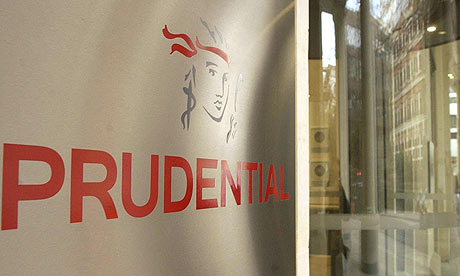Prudential chiefs face calls to quit as AIA deal lies 'dead in the water'
• Cost of AIA debacle likely to be hundreds of millions
• Pru shares up 34p as City breathes sigh of relief

Prudential bosses were tonight facing calls from investors to step down after privately resigning themselves to the costly failure of their ambitious plans to seal a record-breaking $35.5bn (£24bn) takeover of AIG's Asian life-insurance arm, AIA.
Harvey McGrath, its chairman, and Tidjane Thiam, the chief executive, are expected to confirm the deal is dead imminently and to reveal details of the exact cost of the aborted transaction. The bill is expected to run into hundreds of millions of pounds.
Despite surrounding themselves with a legion of advisers, the two men – each with less than 18 months in their jobs – are accused of a breathtaking failure to read the mood of the City and the appetite for risk among Pru shareholders. Investors are disappointed at McGrath and Thiam's decision to press ahead with the costly bid process despite the cool reception it received in the City from day one. They are expected to have little time for explanations that seek to blame market turbulence.
Asked whether they should resign, Robin Geffen, chief investment officer of the fund manager Neptune and a leading critic of the deal, said it would be up to their "individual consciences", but noted the aborted transaction had been "an absurdly ambitious attempt by the Pru to buy a large Asian company, at a very high price, with a very unclear strategy".
He added that Michael McLintock, who heads up the Pru's investment arm M&G, was the "obvious choice" to replace Thiam. "He [McLintock] is widely respected and a safe pair of hands – and importantly he understands the company. The Pru does not have a good track record of hiring from outside." Other possible contenders might include an attempt to poach HSBC finance director Douglas Flint, or the reappointment of Thiam's predecessor Mark Tucker, possibly as an interim chief executive.
A former McKinsey consultant, Thiam joined the Pru in 2008 as finance director, becoming chief executive last October. He earned £1.24m in cash and benefits for 2009 and was awarded hundreds of thousands of shares in Prudential, which are to be released to him if the company's share price performs well. Last year's promotion to chief executive saw his basic salary rise from £650,000 to £900,000.
"Pru will have to explain to us what is strategic plan B," one shareholder said. "You are probably talking about putting the company under strategic review and maybe not under the current chief executive."
AIA refused to reduce the agreed sale price by about $5bn – the discount being sought by McGrath and Thiam over the weekend as part of a last-ditch attempt to keep the deal alive.
Pru said in response that it was "considering its position", but the move was immediately read by investors as killing the transaction. For much of Pru bosses were caught up in the technicalities of extricating themselves from the deal. The acquisition was to be voted on at a shareholder meeting next Monday and investors had increasingly signalled to McGrath and Thiam they were prepared to block the deal at the ballot. Pru shares closed up 34p at 575.5p as the prospect faded that the City would be asked to swallow its biggest ever rights issue needed to finance the deal.
Geffen said: "The real problem with the deal was that it didn't in fact give them any meaningful exposure to mainland China and India, which is exactly where the growth is. So the execution risk of the Pru actually achieving and delivering their strategy was incredibly high."
The Pru had tried to negotiate a price reduction to $30.4bn – made up of $23bn of cash, 2.16bn of new Pru shares worth $5.4bn and $2bn of tier one notes to be issued by Pru.
US government-controlled AIG had agreed to reopen negotiations after a number of Pru investors, including BlackRock and Fidelity Investments, made it clear that the current price was too high and that they would not support the $21bn rights issue needed to fund the takeover.
The American insurer's board voted 10-2 against chief executive Robert Benmosche, who had wanted to cut the transaction price to $30.4bn. Instead, the board decided in favour of resurrecting plans for a partial sale of a stock market listing for AIA in Hong Kong, a plan it had been pursuing before the Pru offer.
Some analysts were suggesting that the Pru is now likely to be broken up, though others said that was premature. "The break-up story is a medium-term view rather than short-term," said Barrie Cornes, a Panmure Gordon analyst.

No comments:
Post a Comment